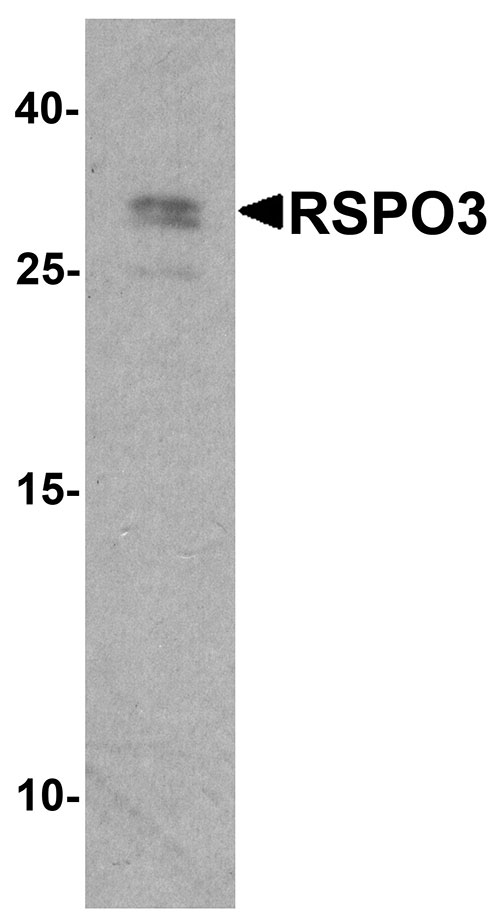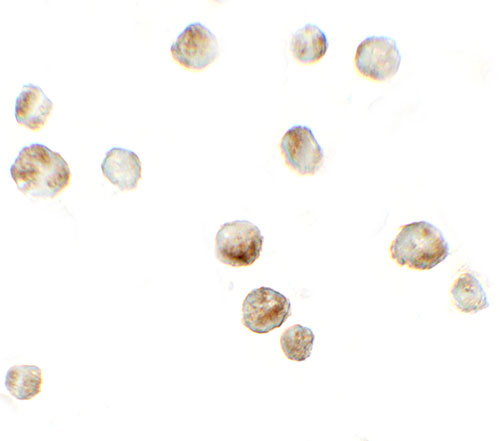RSPO3 Antibody
- 产品详情
- 实验流程
- 背景知识
Application
| WB, IF, ICC, E |
|---|---|
| Primary Accession | Q9BXY4 |
| Other Accession | NP_116173, 18490982 |
| Reactivity | Human, Mouse |
| Host | Rabbit |
| Clonality | Polyclonal |
| Isotype | IgG |
| Calculated MW | 30929 Da |
| Concentration (mg/ml) | 1 mg/mL |
| Conjugate | Unconjugated |
| Application Notes | RSPO3 antibody can be used for detection of RSPO3 by Western blot at 1 - 2 µg/mL. Antibody can also be used for immunocytochemistry starting at 5 µg/mL. For immunofluorescence start at 20 µg/mL. |
| Gene ID | 84870 |
|---|---|
| Other Names | R-spondin-3, Protein with TSP type-1 repeat, hPWTSR, Roof plate-specific spondin-3, hRspo3, Thrombospondin type-1 domain-containing protein 2, RSPO3, PWTSR, THSD2 |
| Target/Specificity | RSPO3; RSPO3 antibody is human and mouse reactive. At least three isoforms of RSPO3 are known to exist; this antibody will detect all three. |
| Reconstitution & Storage | RSPO3 antibody can be stored at 4℃ for three months and -20℃, stable for up to one year. |
| Precautions | RSPO3 Antibody is for research use only and not for use in diagnostic or therapeutic procedures. |
| Name | RSPO3 |
|---|---|
| Synonyms | PWTSR, THSD2 |
| Function | Activator of the canonical Wnt signaling pathway by acting as a ligand for LGR4-6 receptors, which acts as a key regulator of angiogenesis. Upon binding to LGR4-6 (LGR4, LGR5 or LGR6), LGR4-6 associate with phosphorylated LRP6 and frizzled receptors that are activated by extracellular Wnt receptors, triggering the canonical Wnt signaling pathway to increase expression of target genes. Also regulates the canonical Wnt/beta-catenin-dependent pathway and non- canonical Wnt signaling by acting as an inhibitor of ZNRF3, an important regulator of the Wnt signaling pathway. Acts as a ligand for frizzled FZD8 and LRP6. May negatively regulate the TGF-beta pathway (PubMed:21727895, PubMed:21909076, PubMed:22615920). Acts as a key regulator of angiogenesis by controlling vascular stability and pruning: acts by activating the non-canonical Wnt signaling pathway in endothelial cells (By similarity) (PubMed:21727895, PubMed:21909076, PubMed:22615920). Can also amplify Wnt signaling pathway independently of LGR4-6 receptors, possibly by acting as a direct antagonistic ligand to RNF43 and ZNRF3 (PubMed:29769720). |
| Cellular Location | Secreted {ECO:0000250|UniProtKB:Q2TJ95}. |
| Tissue Location | Ubiquitously expressed. Expressed at higher level in placenta, small intestine, fetal thymus and lymph node (PubMed:12463421). Highly expressed in endothelial cells (PubMed:26766444). |
For Research Use Only. Not For Use In Diagnostic Procedures.
Provided below are standard protocols that you may find useful for product applications.
BACKGROUND
RSPO3 is a member of the R-spondin family and plays a role in the regulation of Wnt (wingless-type MMTV integration site family)/beta-catenin and Wnt/planar cell polarity (PCP) signaling pathways, which are involved in development, cell growth and disease pathogenesis (1,2). RSPO3 has been shown to be involved in regulating the balance between angioblast and blood cell specification during embryonic vasculogenesis and angiogenesis and may be involved in tumor development (3,4).
REFERENCES
Chen JZ, Wang S, Tang R, et al. Cloning and identification of a cDNA that encodes a novel human protein with thrombospondin type I repeat domain, hPWTSR. Mol. Biol. Rep. 2002; 29:287-92.
Kim KA, Wagle M, Tran K, et al. R-Spondin family members regulate the Wnt pathway by a common mechanism. Mol. Biol. Cell 2008; 19:2588-96.
Kazanskaya O, Ohkawara B, Heroult M, et al. The Wnt signaling regulator R-spondin 3 promotes angioblast and vascular development. Development 2008; 3655-64.
Seshagiri S, Stawiski EW, Durinck S, et al. Recurrent R-spondin fusions in colon cancer. Nature 2012; 488:660-4.
终于等到您。ABCEPTA(百远生物)抗体产品。
点击下方“我要评价 ”按钮提交您的反馈信息,您的反馈和评价是我们最宝贵的财富之一,
我们将在1-3个工作日内处理您的反馈信息。
如有疑问,联系:0512-88856768 tech-china@abcepta.com.























 癌症的基本特征包括细胞增殖、血管生成、迁移、凋亡逃避机制和细胞永生等。找到癌症发生过程中这些通路的关键标记物和对应的抗体用于检测至关重要。
癌症的基本特征包括细胞增殖、血管生成、迁移、凋亡逃避机制和细胞永生等。找到癌症发生过程中这些通路的关键标记物和对应的抗体用于检测至关重要。 为您推荐一个泛素化位点预测神器——泛素化分析工具,可以为您的蛋白的泛素化位点作出预测和评分。
为您推荐一个泛素化位点预测神器——泛素化分析工具,可以为您的蛋白的泛素化位点作出预测和评分。 细胞自噬受体图形绘图工具为你的蛋白的细胞受体结合位点作出预测和评分,识别结合到自噬通路中的蛋白是非常重要的,便于让我们理解自噬在正常生理、病理过程中的作用,如发育、细胞分化、神经退化性疾病、压力条件下、感染和癌症。
细胞自噬受体图形绘图工具为你的蛋白的细胞受体结合位点作出预测和评分,识别结合到自噬通路中的蛋白是非常重要的,便于让我们理解自噬在正常生理、病理过程中的作用,如发育、细胞分化、神经退化性疾病、压力条件下、感染和癌症。








